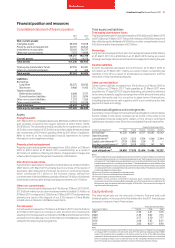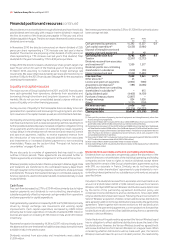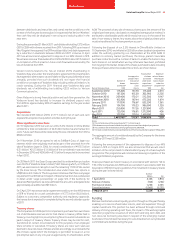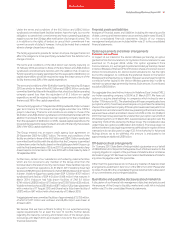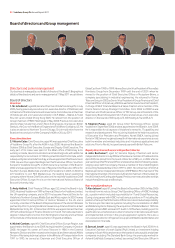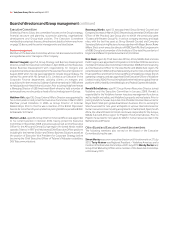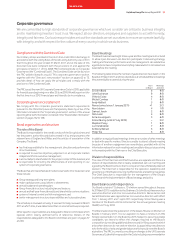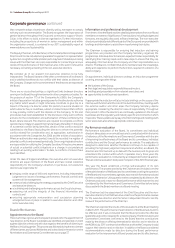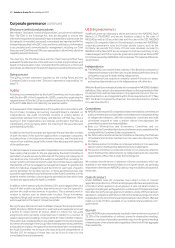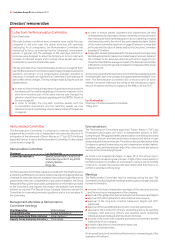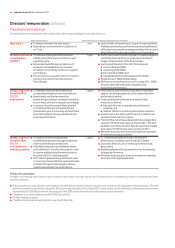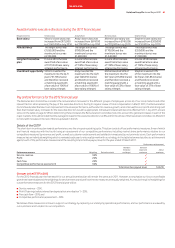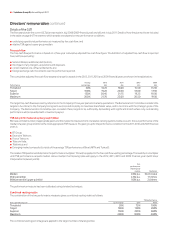Vodafone 2011 Annual Report Download - page 58
Download and view the complete annual report
Please find page 58 of the 2011 Vodafone annual report below. You can navigate through the pages in the report by either clicking on the pages listed below, or by using the keyword search tool below to find specific information within the annual report.56 Vodafone Group Plc Annual Report 2011
Information and professional development
From time to time the Board receives detailed presentations from non-Board
members on matters of significance. Financial plans, including budgets and
forecasts, are regularly discussed at Board meetings. The non-executive
directors periodically visit different parts of the Group and are provided with
briefings and information to assist them in performing their duties.
The Chairman is responsible for ensuring that induction and training
programmes are provided and the Company Secretary organises the
programmes. Individual directors are also expected to take responsibility for
identifying their training needs and to take steps to ensure that they are
adequately informed about the Company and their responsibilities as a
director. The Board is confident that all its members have the knowledge,
ability and experience to perform the functions required of a director of a
listed company.
On appointment, individual directors undergo an induction programme
covering, amongst other things:
■ the business of the Group;
■ their legal and regulatory responsibilities as directors;
■ briefings and presentations from relevant executives; and
■ opportunities to visit business operations.
If appropriate the induction will also include briefings on the scope of the
internal audit function and the role of the Audit Committee, meetings with
the external auditor and other areas the Company Secretary deems
appropriate considering the director’s area of responsibility. Throughout
their period in office the directors are continually updated on the Group’s
businesses and the regulatory and industry specific environments in which
it operates. These updates are by way of written briefings and meetings with
senior executives and, where appropriate, external sources.
Performance evaluation
Performance evaluation of the Board, its committees and individual
directors takes place on an annual basis and is conducted within the terms
of reference of the Nominations and Governance Committee with the aim
of improving the effectiveness of the Board and its committees, individual
contributions and the Group’s performance as a whole. The evaluation is
designed to determine whether the Board continues to be capable of
providing the high level judgement required and whether, as a Board, the
directors are informed and up to date with the business and its goals and
understand the context within which it operates. Every three years the
performance evaluation is conducted by an independent external advisor.
The last external evaluation took place in respect of the 2010 financial year.
This year the Board undertook a formal self-evaluation of its own
performance. The process was led by the Chairman and included a review
of the administration of the Board and its committees covering the operation
of the Board and its committees, agendas, reports and information produced
for their consideration. Using questionnaires completed by all directors, the
Chairman produced a report on Board performance which was sent to and
considered by the Nominations and Governance Committee before being
discussed with the Board members at a Board meeting.
The Chairman led the assessment of the Chief Executive and the non-
executive directors, the Chief Executive undertook the performance reviews
for the executive directors and the Senior Independent Director led the
review of the performance of the Chairman.
The Chairman reported the results of the evaluations at the Board meeting
in March 2011. The performance of each director of the Board was found to
be effective and it was concluded that the Board provides the effective
leadership and control required for a listed company. The Nominations and
Governance Committee confirmed to the Board that the contributions
made by the directors offering themselves for election and re-election at
the AGM in July 2011 continue to be effective and that the Company should
support their election and re-election. In addition, the Board considered
recommendations made by directors during the Board performance
evaluation for the improvement of Board procedures and its effectiveness.
that companies adopt a boardroom diversity policy; we expect to comply
with any such recommendation. The Board recognises the importance of
gender balance throughout the Group and continues to support Vittorio
Colao in his efforts to build a diverse organisation. Further information,
including the proportions of women in senior management and within
the organisation overall, is contained in our 2011 sustainability report at
www.vodafone.com/sustainability.
The Deputy Chairman, John Buchanan, is the nominated Senior Independent
Director and his role includes being available for approach or representation
by directors or significant shareholders who may feel inhibited about raising
issues with the Chairman. He is also responsible for conducting an annual
review of the performance of the Chairman and, in the event it should be
necessary, convening a meeting of the non-executive directors.
We consider all of our present non-executive directors to be fully
independent. The Board is aware of the other commitments of its directors
and is satisfied that these do not conflict with their duties as directors of
the Company. Changes to the commitments of the directors are reported to
the Board.
There are no cross-directorships or significant links between directors
serving on the Board through involvement in other companies or bodies. For
the purpose of section 175 of the Companies Act 2006, the Company’s
articles of association include a general power for the directors to authorise
any matter which would or might otherwise constitute or give rise to a
breach of the duty of a director under this section, to avoid a situation in
which a director has, or could have, a direct or indirect interest that conflicts
or may possibly conflict, with the interests of the Company. To this end
procedures have been established for the disclosure of any such conflicts
and also for the consideration and authorisation of these conflicts by the
Board, where relevant. The directors are required to complete a conflicts
questionnaire, initially on appointment and annually thereafter. In the event
of a potential conflict being identified, details of that conflict would be
submitted to the Board (excluding the director to whom the potential
conflict related) for consideration and, as appropriate, authorisation in
accordance with the Companies Act 2006 and the articles of association.
Where an authorisation was granted, it would be recorded in a register of
potential conflicts and reviewed periodically. On an ongoing basis directors
are responsible for notifying the Company Secretary if they become aware
of actual or potential conflict situations or a change in circumstances
relating to an existing authorisation. To date, no conflicts of interest have
been identified.
Under the laws of England and Wales, the executive and non-executive
directors are equal members of the Board and have overall collective
responsibility for the Company’s direction. In particular, non-executive
directors are responsible for:
■ bringing a wide range of skills and experience, including independent
judgement on issues of strategy, performance, financial controls and
systems of risk management;
■ constructively challenging the strategy proposed by the Chief Executive
and executive directors;
■ scrutinising and challenging performance across the Group’s business;
■ assessing risk and the integrity of the financial information and
controls; and
■ ensuring appropriate remuneration and succession planning
arrangements are in place in relation to executive directors and other
senior executive roles.
Board effectiveness
Appointments to the Board
There is a formal, rigorous and transparent procedure for the appointment of
new directors to the Board. Candidates are identified and selected on merit
against objective criteria and with due regard to the benefits of diversity on
the Board, including gender. This process was followed during the recruitment
of Renee James and Gerard Kleisterlee and is described in the section on the
Nominations and Governance Committee set out on page 57.
Corporate governance continued



